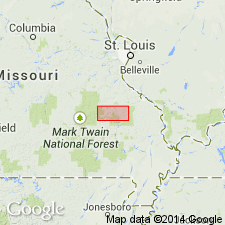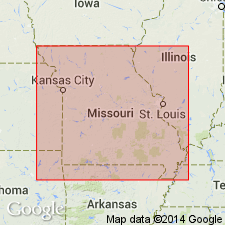
- Usage in publication:
-
- Iron Mountain Lake felsite
- Modifications:
-
- First used
- Dominant lithology:
-
- Felsite
- Volcanics
- AAPG geologic province:
-
- Midcontinent region
Summary:
First published use in St. Francois Mountains, southeast MO, Midcontinent region. [Not clear if authors intended stratigraphic units within study area to be formal or informal.] No type locality designated. Mapped undivided with Tribby breccia (first used), Wolf Mountain ignimbrite (brief mention), and Ironton Hollow rhyolite (first used) in area between Iron Mountain, St. Francois Co, and Ironton, Iron Co. Unit is homogeneous welded ash flow tuff breccia; uniformly black matrix; abundant lithic fragments consisting of rhyolitic ash flow tuff, altered basalt, and graphic granite; phenocrysts of epidotized plagioclase, quartz, and chloritized hornblende are not abundant. Thickness is 300 m. Unconformably overlies Grassy Mountain ignimbrite; older than Tribby breccia. Table of stratigraphic units; geologic map. Most volcanic rocks of St. Francois Mountains are 1485 m.y. old (Proterozoic).
[Authors' intentions are unclear as to which, if any, of the geologic units discussed should have formal status.]
Source: GNU records (USGS DDS-6; Denver GNULEX).

- Usage in publication:
-
- Iron Mountain Lake Ignimbrite
- Modifications:
-
- Revised
- Overview
- AAPG geologic province:
-
- Midcontinent region
Summary:
Revised in that Iron Mountain Lake overlies (though contact relations are poorly defined) Wolf Mountain Ignimbrite (first used) in central St. Francois Mountains, southeast MO, Midcontinent region. Mapped (fig. 1) west of regional angular unconformity. (Rocks east and north of unconformity are older than rocks west of it). Unit is a crystal-poor tuff containing abundant flattened pumice fragments; xenoliths of uncorrelated diabase, rhyolite and graphic granite are locally abundant. Minimum thickness is 200 m. Younger than Tribby Breccia. Petrologic data. Proterozoic age (1440-1480 Ma).
Source: GNU records (USGS DDS-6; Denver GNULEX).
For more information, please contact Nancy Stamm, Geologic Names Committee Secretary.
Asterisk (*) indicates published by U.S. Geological Survey authors.
"No current usage" (†) implies that a name has been abandoned or has fallen into disuse. Former usage and, if known, replacement name given in parentheses ( ).
Slash (/) indicates name conflicts with nomenclatural guidelines (CSN, 1933; ACSN, 1961, 1970; NACSN, 1983, 2005, 2021). May be explained within brackets ([ ]).

